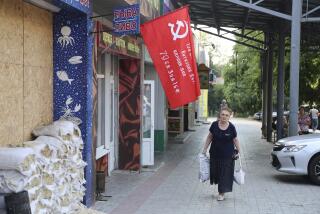NEWS ANALYSIS : West Is Also Likely to Ignore Lithuania Vote : Secession: The Baltic state’s independence bid is overshadowed by the Persian Gulf War. Its next major task is seen as shoring up its economy.
- Share via
VILNIUS, Soviet Union — Once again, Lithuania is the Baltic mouse that roared. But, also again, its problem will be finding a way to make Moscow listen.
Lithuanian political leaders were certain of success in this weekend’s plebiscite, but the scale of their triumph--more than 90% of those who voted favored independence from the Soviet Union--still staggered them a day later.
It was “a victory against lies, against attempts to scare us, against fear,” President Vytautas Landsbergis said. In a televised message, he said: “Today, we did good work and took one more step along the road.”
Just how to exploit that latest step and move Lithuania toward independence will be debated in Parliament when it reconvenes here today. Initiatives are being contemplated in at least three areas--diplomacy, the economy and the law--although some of them are likely to be far more symbolic than practical.
Meanwhile, Lithuanian Foreign Minister Algirdas Saudargas, in London when the referendum took place, will attempt to use the returns to demonstrate that his government, not the one in Moscow, is the sole legitimate representative of the Lithuanian people.
Rapid acceptance abroad, however, is highly improbable. Only Iceland has, in effect, recognized Lithuania’s sovereignty, and that gesture drew a stinging rebuke last week, when the Soviet Foreign Ministry accused the small North Atlantic Treaty Organization member of meddling in Soviet internal affairs.
As the Westward-looking Lithuanians are painfully aware, the United States and its partners in the Persian Gulf War coalition are unlikely to jeopardize Soviet support of their military onslaught against the forces of Iraqi President Saddam Hussein by making some quixotic gesture in favor of Baltic self-determination.
The Lithuanian Parliament spokesman, Audrius Azubalis, said the republic’s chief task in building on Saturday’s popular mandate will be to adopt an economic reform law allowing state-held assets to become private, to arrest the free fall of the Lithuanian economy and support its relatively high standard of living.
“Without this law, we are simply defenseless,” Azubalis said. “We need to build up our economy, from the inside out.”
Prime Minister Gediminas Vagnorius said he believes that, by selling some state properties, Lithuania can defray its internal debt, which the government newspaper has put at roughly equivalent to $9.9 billion, about equal to the nation’s agricultural and industrial earnings for one year.
Landsbergis said in an interview that the privatization plan, still being debated in parliamentary committees, would have the political benefit of further fracturing the government-run economic network that remains one of the last bastions of the pro-Soviet Communist Party.
Finally, the presidium of the Lithuanian Supreme Council is expected to ask the Parliament to amend the constitution to reflect the voters’ resounding approval of Lithuania’s becoming “a democratic, independent republic.”
Whether all those measures will have any influence on Soviet President Mikhail S. Gorbachev and the Kremlin leadership seems doubtful, however, to many opinion-makers here.
“I expect the deadlock with Moscow to go on and on for months,” said one journalist who maintains close contacts with the Landsbergis government.
Central Soviet media reaction showed that Moscow officials were not impressed with the results of what Gorbachev had rejected in advance as meaningless voting.
Tass, the official Soviet news agency, said: “The question, as posed in the (referendum), practically excluded a negative answer. Who would want to live in a dependent, anti-democratic republic? The poll has no right by itself to replace the resolution of political and economic problems, or to tear apart ties formed by history.”
If that assessment is any guide, Gorbachev will continue to insist that Lithuania follow a cumbersome secession procedure enacted last year. It requires specific voter approval of withdrawal from the Soviet Union in a process that would take at least five years.
The team Gorbachev appointed earlier this month to negotiate with the Lithuanians is loaded with envoys of central bureaucracies sternly opposed to any breakup of the Soviet Union--state planners and representatives of the police and defense industries.
Its principal luminary is the chief of the armed forces’ general staff, Gen. Mikhail A. Moiseyev, an avowed foe of the “separatists.”
Close associates of Landsbergis said that he learned of the negotiating team through news dispatches--additional proof of abysmal relations between him and Gorbachev. (The Soviet president has said he finds Landsbergis impossible to deal with and is believed to detest the music professor-turned-nationalist leader.)
Another element of the disquiet in Lithuania is the continued potential for mayhem represented by the presence of Soviet troops.
Ten days of military maneuvers throughout the Baltic region were to begin Sunday, but there was no immediate report of troop movements.
For Lithuanians seeking to regain the independent status lost since 1940, the vote Saturday was no cause for jubilation but one more reason to believe firmly in their cause.
“We have done what we could,” Azubalis, the Lithuanian Parliament spokesman, said with evident satisfaction.
“The nation has confirmed that it wants to live freely.”
More to Read
Sign up for Essential California
The most important California stories and recommendations in your inbox every morning.
You may occasionally receive promotional content from the Los Angeles Times.










